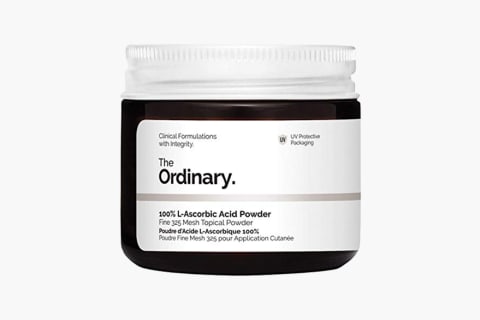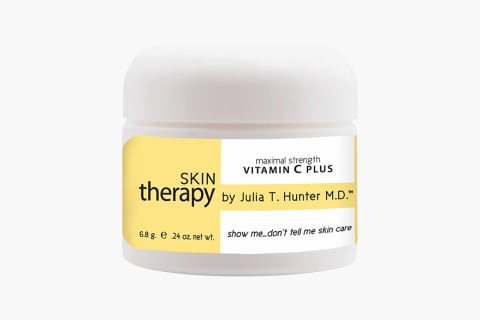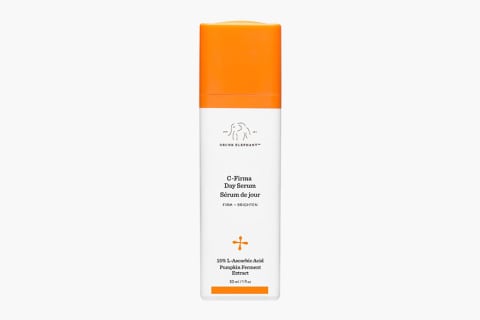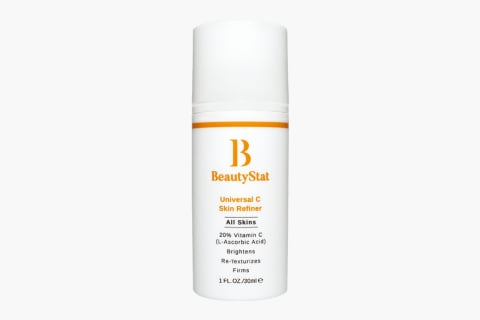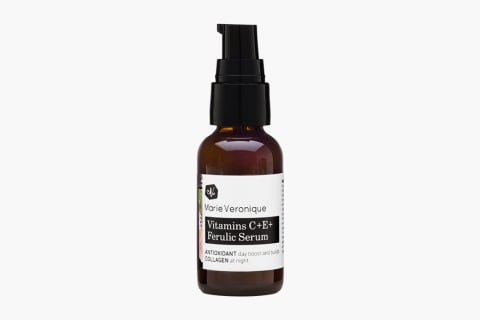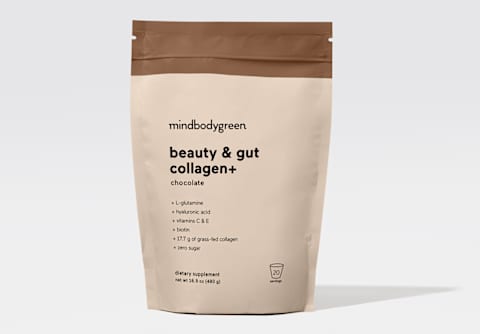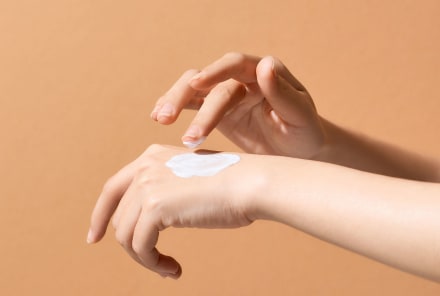Advertisement
Vitamin C Benefits For Skin + 6 Tips For Finding The Best Product



Vitamin C skin care products check all the boxes: turn back the clock on wrinkles, fight free radicals, even out skin tone, and give your complexion a serious glow. "Vitamin C is one of the few active ingredients that can benefit all skin types," says Elizabeth Tanzi, M.D., board-certified dermatologist in the Washington, D.C., metro area and associate professor of dermatology at George Washington University Medical Center. Here, what you need to know about the skin-saving ingredient—and the very important reason you should be taking it via supplements.
What are the benefits of vitamin C for skin topically?
The benefits you see from vitamin C use boil down to two main areas: collagen production and complexion quality.
- Collagen: The one that's most likely to get your attention is vitamin C's role in collagen production. It doesn't just stimulate collagen production; it stabilizes the collagen1 you have, leading to overall wrinkle reduction. Think about collagen like the elastic in your favorite pair of perfectly supportive stretchy jeans or yoga pants, says Julia T. Hunter, M.D., founder of Wholistic Dermatology in Beverly Hills. "If you don't have vitamin C, your collagen can't cross-link to lift and tighten skin."
- Overall skin tone and health: Using vitamin C topically has been shown to help overall quality and tone by diminishing hyperpigmentation1, brightening2 complexions, decreasing moisture3 loss, help reduce skin inflammation1, and fighting against UV-induced photodamage4. In fact, vitamin C can help almost any skin issue you can think of, from dark spots and discoloration to combating rosacea1 and acne1 to wrinkles and sagging. "It's one of the best anti-aging products you can use on the surface of your skin, and the younger you start, the better," says Hunter.
The one downside: Vitamin C is notoriously unstable.
So what's the catch? Yes, on paper vitamin C for skin is the total package. But it's not without its flaws.
"Because vitamin C is a water-soluble vitamin, if vitamin C is formulated in a cream, liquid, or serum, it starts oxidizing and losing its chemical power," says Hunter, as any time an unstable ingredient is mixed with another it can start oxidizing and lose its efficacy. Not only that, but products lose potency5 as soon as they're exposed to air, heat, light, and water—just think of how fast a sliced apple turns brown—vitamin C can be difficult1 to deliver into the dermis, which makes turning vitamin C into a serum or mask extra tricky.
To combat the stability and permeability issues, vitamin C comes in many derivatives, including L-ascorbic acid, magnesium ascorbyl phosphate, tetrahexyldecyl ascorbate, ascorbyl palmitate, sodium ascorbyl phosphate, and ascorbyl tetraisopalmitate. (Unlike L-ascorbic acid, which is hydrophilic and unstable, both ascorbyl-6-palmitate and magnesium ascorbyl phosphate are stable at neutral pH6.) And then there are the forms themselves, everything from serums to creams to powders.
6 tips for finding a high-quality vitamin C skin care product + how to use it.
While it might feel like you need a chemistry degree to cut through the clutter, we narrowed it down to the top six things you need to know when picking, storing, and using vitamin C for your face to get the most benefit for your buck:
Look for straight L-ascorbic acid (LAA) in serums.
L-ascorbic acid is the most active1 form of vitamin C (other forms must be converted into L-ascorbic acid before the body can use it), and the most proven7 to work. But note that more vitamin C is not better. Research has found 10 to 20%7 concentrations the most effective. "Small amounts are usually all that's needed and best to use on clean skin before other products," adds Tanzi. The pH of the LAA needs to be acidic3 (3.0 to 3.5) to penetrate the skin, which can cause irritation in some people. However, sensitivities to LAA are relatively rare, as vitamin C is pretty universally tolerable. If you introduce a vitamin C serum and find that you are sensitive—read: redness—avoid further irritation by eliminating all other acidic ingredients (e.g., alpha-hydroxy acids like lactic acid and glycolic acid), only use gentle products elsewhere in your routine, or consider switching to a less active form of vitamin C. Also, you don't need to start with the strongest serum on the market; it's fine to start at a lower concentration and work your way up.
Packaging makes a difference.
Vitamin C can break down in UV light and lessen its potency. Make sure the packaging is sealed and bottled in opaque squeeze tubes or pump bottles, or at the very least a dark amber bottle. Store in a cool, dry place. Downside: If the product turns yellow-brown or smells off, it could mean the vitamin C has oxidized and lost its potency.
Vitamin C powder is inexpensive, easy, and doesn't degrade.
One solution to vitamin C's instability problem is powdered vitamin C. It's more stable and therefore more potent than liquid versions. Simply mix a pinch of powder into your favorite moisturizer, serum, face oil, or sunscreen. Products can range from The Ordinary 100% L-Ascorbic Acid Powder (a brand known for offering products that stick to one effective ingredient, without extras, so they can keep the price points down) to Skin Therapy Maximal Strength Vitamin C Plus. "The powder should feel like powdered sugar, not table sugar; otherwise, it's hard to dissolve," says Hunter. Downside: Because most powders are made of L-ascorbic acid, you need the right pH to penetrate, which can be tricky when you're acting as your own chemist. Mixing with most facial moisturizers should bring it into the right range, as long as you don't combine it with already acidic ingredients like alpha-hydroxy acids. And even though many dermatologists are on board with vitamin C powder, there are no lab tests proving its effectiveness.
Antioxidants can increase vitamin C's potency.
Vitamin C works on its own, but pairing it with other antioxidants can boost its potency. "Certain antioxidants are synergistic," says Hunter. "They strengthen one another, regenerate one another, and last longer in the body, so they're more available in the skin." One study1 found that vitamin E and ferulic acid increase vitamin C's effectiveness eightfold. Try Marie Veronique Vitamins C+E+Ferulic Serum or Drunk Elephant C-Firma Day Serum. Another option is EGCG, which is the most active component in green tea, like in Beauty Stat Universal C Skin Refiner. Other additives to look for: hyaluronic acid to smooth the skin, and aloe to soothe. Downside: With more active ingredients, products can get pricey.
Apply vitamin C in the morning.
The general skin care rule is prevention by day and repair by night; yet vitamin C falls under both categories, so when is the best time to apply it? Well, ideally both, but if you can only remember to do it once a day—or are savoring your product—pick the morning. "I like my antioxidants in the daytime because there is some evidence to suggest they can work with sunscreen to impart environmental protection," says Tanzi. Apply in the morning, and think of your vitamin C as an extra layer of sun protection: As this research shows1, there is a decreased risk of sun-induced redness (by 52%) and UV cell damage (by 40 to 60%).
Keep an eye out for new technology.
Why you should take vitamin C supplements.
Your body can't make8 its own vitamin C or store it. "Vitamin C in humans must be ingested for survival. Most of the animal kingdom can produce its own vitamin C; however, humans cannot produce it and therefore need to consume it to maintain life," says cosmetic chemist Ron Robinson. "Vitamin C is required for support of tissues in all parts of the body including the skin.* It is essential for life and in healing wounds and maintaining the integrity of gums, bones, and teeth."*
Most notably for skin, ingesting vitamin C has solid research to prove it will support overall skin health3.* According to a study9 published in the American Journal of Clinical Nutrition, higher vitamin C intake is associated with less wrinkled skin.* It's also shown to help manage oxidative stress in cells thanks to its antioxidant properties—this not only supports skin cell health but can help support skin from previous UV damage10.*
That means you need vitamin C from outside sources. You can also increase your vitamin C intake by regularly eating fruits and vegetables—think leafy greens, citrus fruits, strawberries, red peppers, Brussels sprouts. If you're not getting it in your diet, consider a supplement.*
"Start out with 1,000 mg vitamin C a day and gradually increase to 1,000 mg twice a day, although dial it down if you experience cramping or diarrhea," says Hunter.* Other experts say to cap vitamin C supplements at 250 mg a day, noting that because it's a water-soluble vitamin, you're just getting rid of extra.* As always, if you have questions about incorporating a new supplement into your routine, consult your doctor first.*
The bottom line.
If you're looking for a skin care active that offers a plethora of skin-healthy traits, vitamin C is one of your best bets. Not only does it offer quick, superficial benefits (like brightening), but it improves skin cell function at the cellular level.* "People should take vitamin C internally and put it on the surface of their skin," says Hunter, who recommends putting it on your skin every morning as well as taking a daily supplement.* It's a vitamin that we all need for healthy, glowing skin.
10 Sources
- https://www.ncbi.nlm.nih.gov/pmc/articles/PMC3673383/
- https://www.ncbi.nlm.nih.gov/pmc/articles/PMC4562654/
- https://www.ncbi.nlm.nih.gov/pmc/articles/PMC5579659/
- https://www.ncbi.nlm.nih.gov/pubmed/22206077
- https://www.ncbi.nlm.nih.gov/pubmed/18045356
- https://www.ncbi.nlm.nih.gov/pmc/articles/PMC5605218/#B6
- https://www.ncbi.nlm.nih.gov/pmc/articles/PMC5605218/
- https://www.ncbi.nlm.nih.gov/pubmed/11407971
- https://academic.oup.com/ajcn/article/86/4/1225/4649573
- https://www.ncbi.nlm.nih.gov/pubmed/20189681
